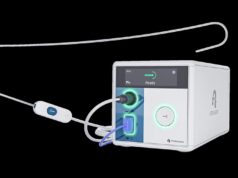
Results from the real-world study XANTUS have shown low rates of major bleeding in patients with atrial fibrillation taking rivaroxaban (Xarelto, Bayer Healthcare) for stroke prevention. Data were consistent with findings from the pivotal phase III clinical trial, ROCKET-AF.
Results from XANTUS were presented at the European Society of Cardiology Congress (ESC; 28 August – 2 September, London, UK) and simultaneously published in the European Heart Journal.
“Real-world evidence is increasingly important for physicians as it complements and expands on what is already known from clinical trials,” said XANTUS principal investigator John Camm, professor of Clinical Cardiology in the Cardiovascular and Cell Sciences Research Institute at St George’s University of London, UK. “XANTUS is a real-world study that does just that – the findings demonstrate the safety and effectiveness of rivaroxaban across a broader range of patients, specifically those at lower risk of stroke yet still in need of anticoagulation therapy. XANTUS gives physicians reassurance to prescribe rivaroxaban as an effective and generally well-tolerated treatment option for both their high- and lower-risk patients with atrial fibrillation.”
XANTUS, which included 6,500 patients across the United Kingdom and Europe, is the first international, prospective real-world evidence study in patients with atrial fibrillation with a non-vitamin K oral anticoagulant (NOAC). The study reaffirms the positive benefit-risk profile of rivaroxaban for stroke prevention in patients with atrial fibrillation, first shown in the pivotal phase III clinical trial ROCKET-AF. The incidence of major bleeding in patients taking rivaroxaban was 3.6 per 100 person-years in ROCKET-AF. In XANTUS, the incidence of major bleeding associated with rivaroxaban was 2.1 per 100 person-years. While patients in ROCKET-AF were moderate to high risk with a mean CHADS2 score of 3.5, patients studied in XANTUS had a lower average risk of stroke, with a mean CHADS2 score of 2.0.
XANTUS is part of the extensive study programme for rivaroxaban that is expected to include more than 275,000 patients in clinical trials and real-world studies (this includes patients on rivaroxaban, placebo or active comparator).









